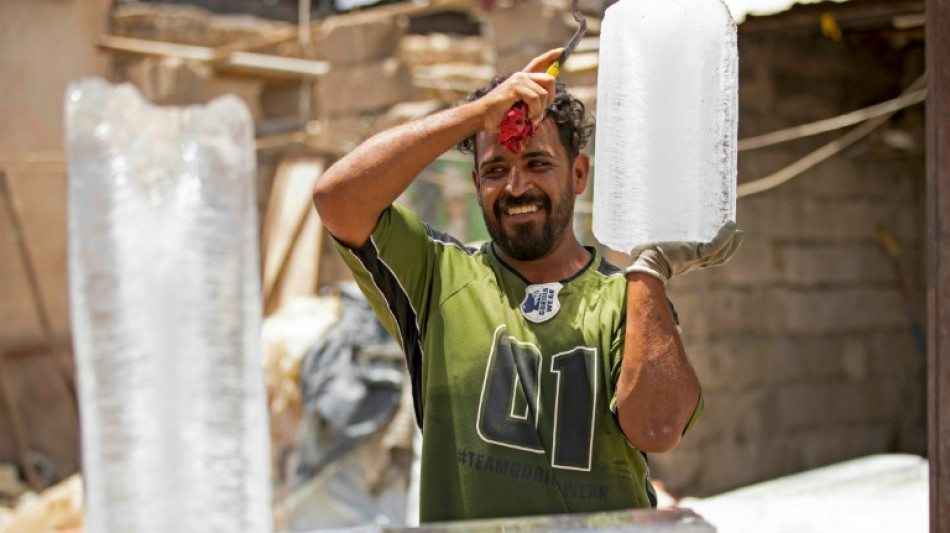
-
 Myanmar pro-military party claims Suu Kyi's seat in junta-run poll
Myanmar pro-military party claims Suu Kyi's seat in junta-run poll
-
Fed chair Powell says targeted by federal probe

-
 Trailblazing Milos Raonic retires from tennis
Trailblazing Milos Raonic retires from tennis
-
Australia recalls parliament early to pass hate speech, gun laws

-
 'One Battle After Another,' 'Hamnet' triumph at Golden Globes
'One Battle After Another,' 'Hamnet' triumph at Golden Globes
-
Japan aims to dig deep-sea rare earths to reduce China dependence

-
 Top UN court to hear Rohingya genocide case against Myanmar
Top UN court to hear Rohingya genocide case against Myanmar
-
US sends more agents to Minneapolis despite furor over woman's killing

-
 Trump says Iran 'want to negotiate' after reports of hundreds killed in protests
Trump says Iran 'want to negotiate' after reports of hundreds killed in protests
-
Bangladesh's powerful Islamists prepare for elections

-
 NBA-best Thunder beat the Heat as T-Wolves edge Spurs
NBA-best Thunder beat the Heat as T-Wolves edge Spurs
-
Ukraine's Kostyuk defends 'conscious choice' to speak out about war

-
 Trump says working well with Venezuela's new leaders, open to meeting
Trump says working well with Venezuela's new leaders, open to meeting
-
Asian equities edge up, dollar slides as US Fed Reserve subpoenaed

-
 Hong Kong court hears sentencing arguments for Jimmy Lai
Hong Kong court hears sentencing arguments for Jimmy Lai
-
Powell says Federal Reserve subpoenaed by US Justice Department

-
 Chalamet, 'One Battle' among winners at Golden Globes
Chalamet, 'One Battle' among winners at Golden Globes
-
Turning point? Canada's tumultuous relationship with China

-
 Eagles stunned by depleted 49ers, Allen leads Bills fightback
Eagles stunned by depleted 49ers, Allen leads Bills fightback
-
Globes red carpet: chic black, naked dresses and a bit of politics

-
 Maduro's fall raises Venezuelans' hopes for economic bounty
Maduro's fall raises Venezuelans' hopes for economic bounty
-
Golden Globes kick off with 'One Battle' among favorites

-
 Australian Open 'underdog' Medvedev says he will be hard to beat
Australian Open 'underdog' Medvedev says he will be hard to beat
-
In-form Bencic back in top 10 for first time since having baby

-
 Swiatek insists 'everything is fine' after back-to-back defeats
Swiatek insists 'everything is fine' after back-to-back defeats
-
Wildfires spread to 15,000 hectares in Argentine Patagonia

-
 Napoli stay in touch with leaders Inter thanks to talisman McTominay
Napoli stay in touch with leaders Inter thanks to talisman McTominay
-
Meta urges Australia to change teen social media ban

-
 Venezuelans await political prisoners' release after government vow
Venezuelans await political prisoners' release after government vow
-
Lens continue winning streak, Endrick opens Lyon account in French Cup

-
 McTominay double gives Napoli precious point at Serie A leaders Inter
McTominay double gives Napoli precious point at Serie A leaders Inter
-
Trump admin sends more agents to Minneapolis despite furor over woman's killing

-
 Allen magic leads Bills past Jaguars in playoff thriller
Allen magic leads Bills past Jaguars in playoff thriller
-
Barca edge Real Madrid in thrilling Spanish Super Cup final

-
 Malinin spearheads US Olympic figure skating challenge
Malinin spearheads US Olympic figure skating challenge
-
Malinin spearheads US figure Olympic figure skating challenge

-
 Iran rights group warns of 'mass killing', govt calls counter-protests
Iran rights group warns of 'mass killing', govt calls counter-protests
-
'Fragile' Man Utd hit new low with FA Cup exit

-
 Iran rights group warns of 'mass killing' of protesters
Iran rights group warns of 'mass killing' of protesters
-
Demonstrators in London, Paris, Istanbul back Iran protests

-
 Olise sparkles as Bayern fire eight past Wolfsburg
Olise sparkles as Bayern fire eight past Wolfsburg
-
Man Utd knocked out of FA Cup by Brighton, Martinelli hits hat-trick for Arsenal

-
 Troubled Man Utd crash out of FA Cup against Brighton
Troubled Man Utd crash out of FA Cup against Brighton
-
Danish PM says Greenland showdown at 'decisive moment' after new Trump threats

-
 AC Milan snatch late draw at Fiorentina as title rivals Inter face Napoli
AC Milan snatch late draw at Fiorentina as title rivals Inter face Napoli
-
Venezuelans demand political prisoners' release, Maduro 'doing well'

-
 'Avatar: Fire and Ashe' leads in N.America for fourth week
'Avatar: Fire and Ashe' leads in N.America for fourth week
-
Bordeaux-Begles rout Northampton in Champions Cup final rematch

-
 NHL players will compete at Olympics, says international ice hockey chief
NHL players will compete at Olympics, says international ice hockey chief
-
Kohli surpasses Sangakkara as second-highest scorer in international cricket


For Iraqis a sweltering summer of 'hell' has begun
Umm Mohammed, 74, waves a fan back and forth to cool down, but in the blistering heat of Iraq's southern city of Basra there is nothing but stiflingly hot air.
While Basra is used to scorching summers, this year it has started sooner than expected, bringing misery to residents in a city also plagued by chronic electricity shortages.
"By God, we are tired," Umm Mohammed said faintly, adding that the heat had woken her up in the middle of the night.
Just days into summer, the temperature in Basra has already soared to around 45 degrees Celsius (113 Fahrenheit).
Umm Mohammed's modest home has a flimsy sheet-metal roof that retains the sweltering heat.
Further north in the capital Baghdad, temperatures have already topped 50 Celsius -- in the shade.
Battered by decades of conflict that has sapped its infrastructure, Iraq is struggling with droughts, repeated sandstorms, desertification and a drop in some river levels.
Chronic power cuts are exacerbated in the summer, and only those who can afford private generators are able to keep their fridges or air conditioning units running.
In Basra, high humidity compounds the oppressive heat.
And with many Iraqis struggling to survive, spending around $105 dollars a month for a private generator is not an option.
The authorities "must help poor people", Umm Mohammed said, decrying their failure to provide an adequate mains supply.
Referring to how the government treats its citizens, she said: "Even God does not agree to that."
- 'It's hell' -
Iraq is the second-largest oil producer in the OPEC cartel.
But the once thriving country has for years bought gas from neighbouring Iran, which supplies about one-third of its power sector needs.
US sanctions on Iranian oil and gas have complicated Baghdad's payments for the imports, leaving Iraq in heavy arrears and prompting Tehran to periodically switch off the taps.
The result is longer power cuts for most of Iraq's 41-million-strong population, many of whom blame politicians and endemic corruption for their plight.
Anger over blackouts helped fuel deadly protests from late 2019 to mid-2020, including many in southern Iraq.
Nataq al-Khafaji, who lives in Nasiriyah, just north of Basra, said getting by in the heat without electricity was "very difficult for the children and the elderly".
"It's hell," he added.
During the summer holidays, Khafaji's three children have nowhere to go and little to do.
Stuck in their darkened home, they try as best as they can to escape the suffocating heat outdoors.
Khafaji has bought a battery-operated fan, but expressed worry that it would not be enough during the worst months "when it will be close to 50 degrees".
- 'National priority' -
The United Nations ranks Iraq as one of the top five countries most vulnerable to climate change.
Since mid-April, it has been battered by 10 sandstorms -- a product of intense drought, soil degradation, high temperatures and low rainfall linked to climate change.
President Barham Saleh has warned that tackling climate change "must become a national priority for Iraq as it is an existential threat to the future of our generations to come".
Saleh said desertification affects 39 percent of Iraq, where water supplies are also dwindling drastically and crop yields are declining.
With heat waves and dust storms "expected to increase over the years", so will health issues, said Seif al-Badr, a spokesman for the health ministry.
"We expect to be treating more people for a variety of illnesses linked to climate" change, he told AFP.
But efforts to address such issues appear to have been shelved, as Iraq grapples with political deadlock that has left it without a new government after polls last October.
The World Bank has warned that unless solutions are found, Iraq could lose 20 percent of its water resources by 2050 due to climate change.
S.Abdullah--SF-PST




